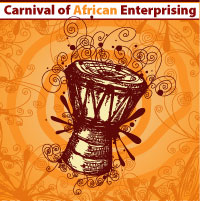The Carnival of African Entrepreneuring
 There seems to be four broad schools of African economic development theory. The first, and rather antiquated theory, revolves around infrastructure. This was the basis of the World Bank's theory for much of its existence and resulted in such unsuccessful ventures as major dam and power plants. The second theory is based on corruption, shared by a broad group from Paul Wolfowitz to George Ayittey, which claims that 'Africa's begging bowl is leaky', therefore there is no reason to give more until the holes are patched.
There seems to be four broad schools of African economic development theory. The first, and rather antiquated theory, revolves around infrastructure. This was the basis of the World Bank's theory for much of its existence and resulted in such unsuccessful ventures as major dam and power plants. The second theory is based on corruption, shared by a broad group from Paul Wolfowitz to George Ayittey, which claims that 'Africa's begging bowl is leaky', therefore there is no reason to give more until the holes are patched.
Third, and most fashionable, a la Bono and Millenium Development Goals (MDG's) is that Africa simply needs more aid. Finally, and perhaps most interestingly, is the theory hosted by the African digerati, the organizers of the TED Global conference, and most of the blogosphere that I am a part of, that Africa is in need of creative entrepreneurs to help make their communities wealthy.
Though any approach to development clearly needs elements of all of the above tactics, it seems to me that the final approach is the position in most need of strengthening. As a contribution to this camp, I I wrote a short piece on the Emerging Cameroonian Film Industry, which made it onto the Carnival of African Enterprising (3rd Edition) hosted by White African. The Carnival is a wonderful initiative to summons the power of bloggers to find fascinating entrepreneurs and untapped ideas for making Africa a better place. Taking an entrepreneurial focus to development is also the most creative and interesting of the development theory strains. In what other discourse do you find a contributor like Tunde Noibi, founder of Afrokicks, a company that makes African-flag themed shoes! I always loved the Cameroonian flag, so I'm waiting to see on a pair of kicks I can wear around.
Labels: ICT4D
 Joshua Goldstein is in search of the best route to bicycle from Kampala to Capetown.
Joshua Goldstein is in search of the best route to bicycle from Kampala to Capetown.